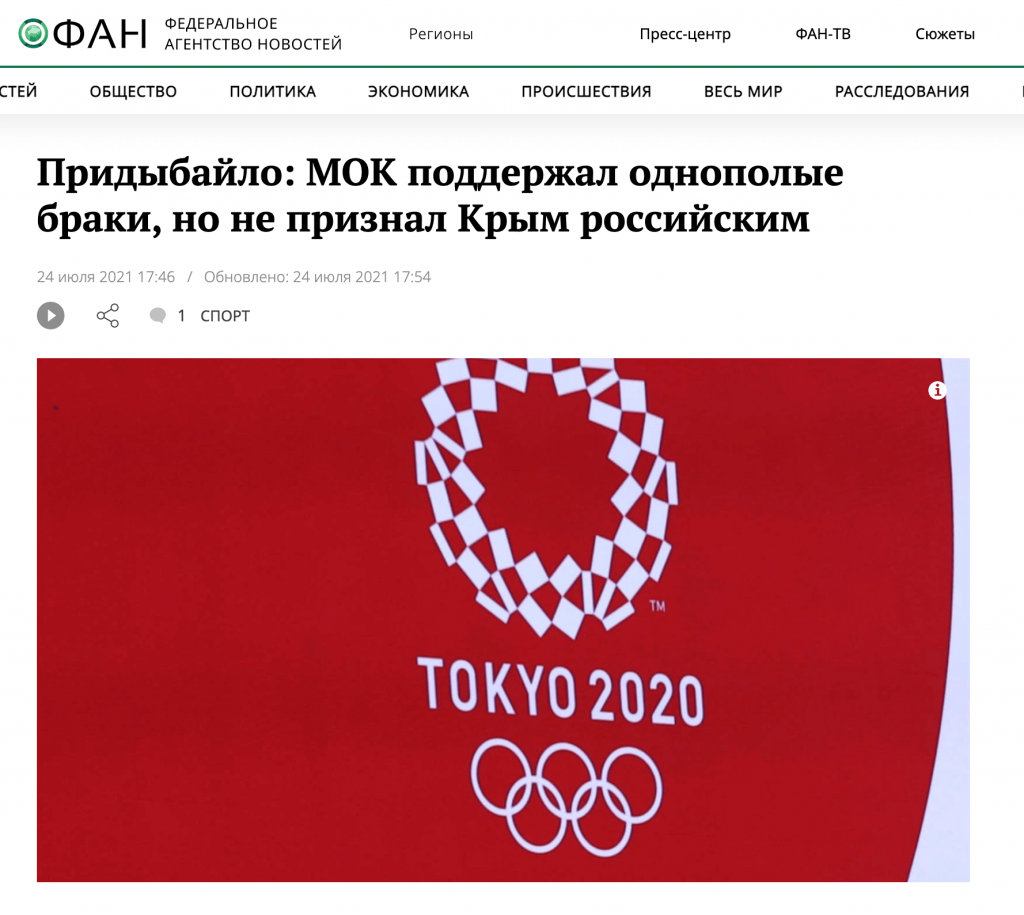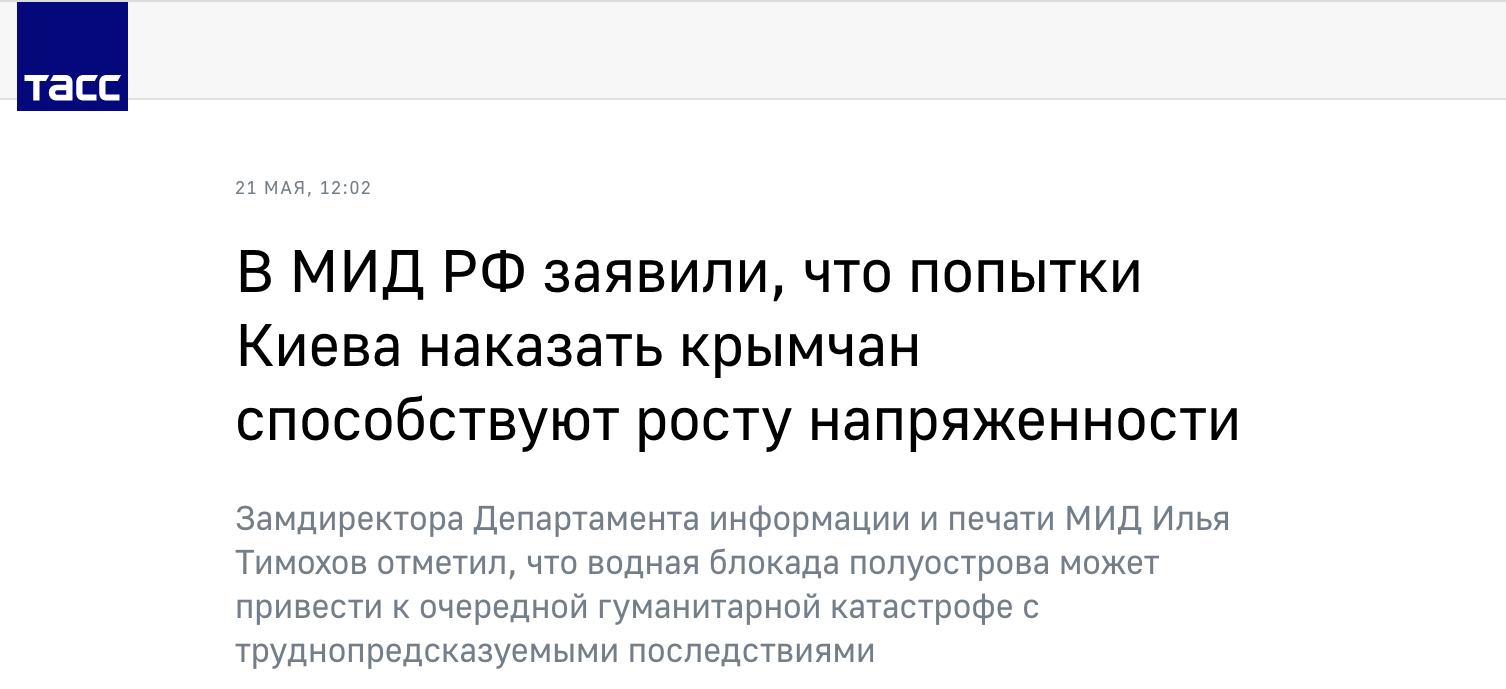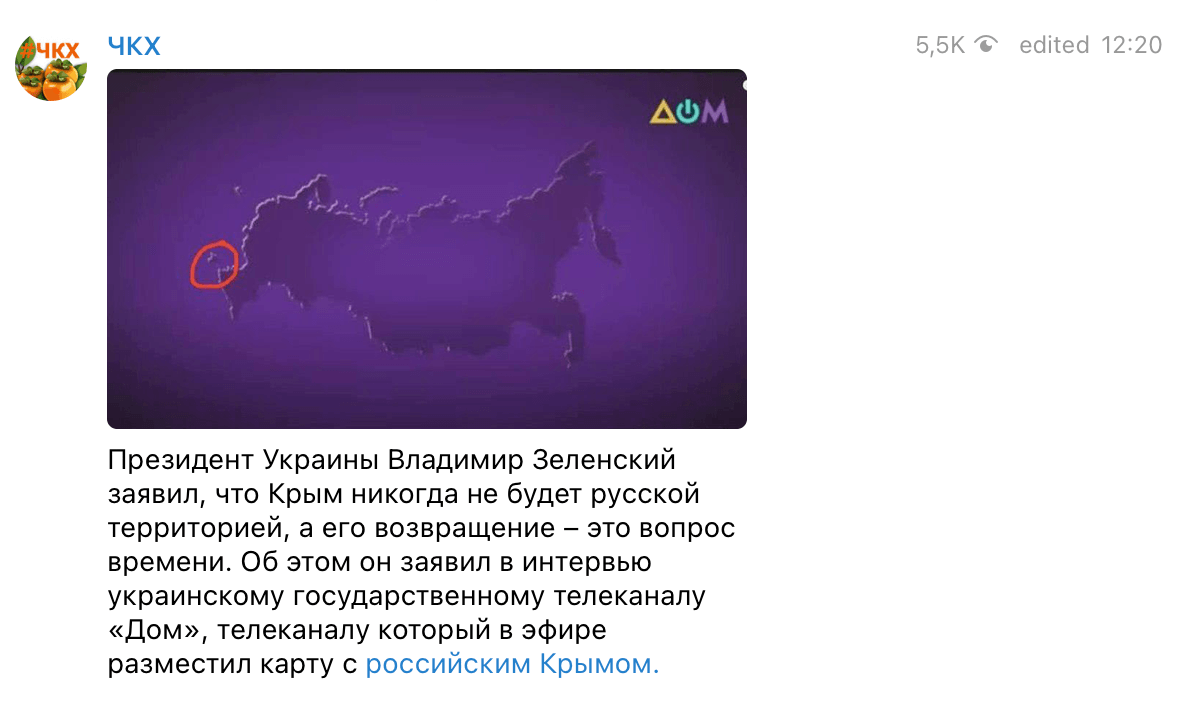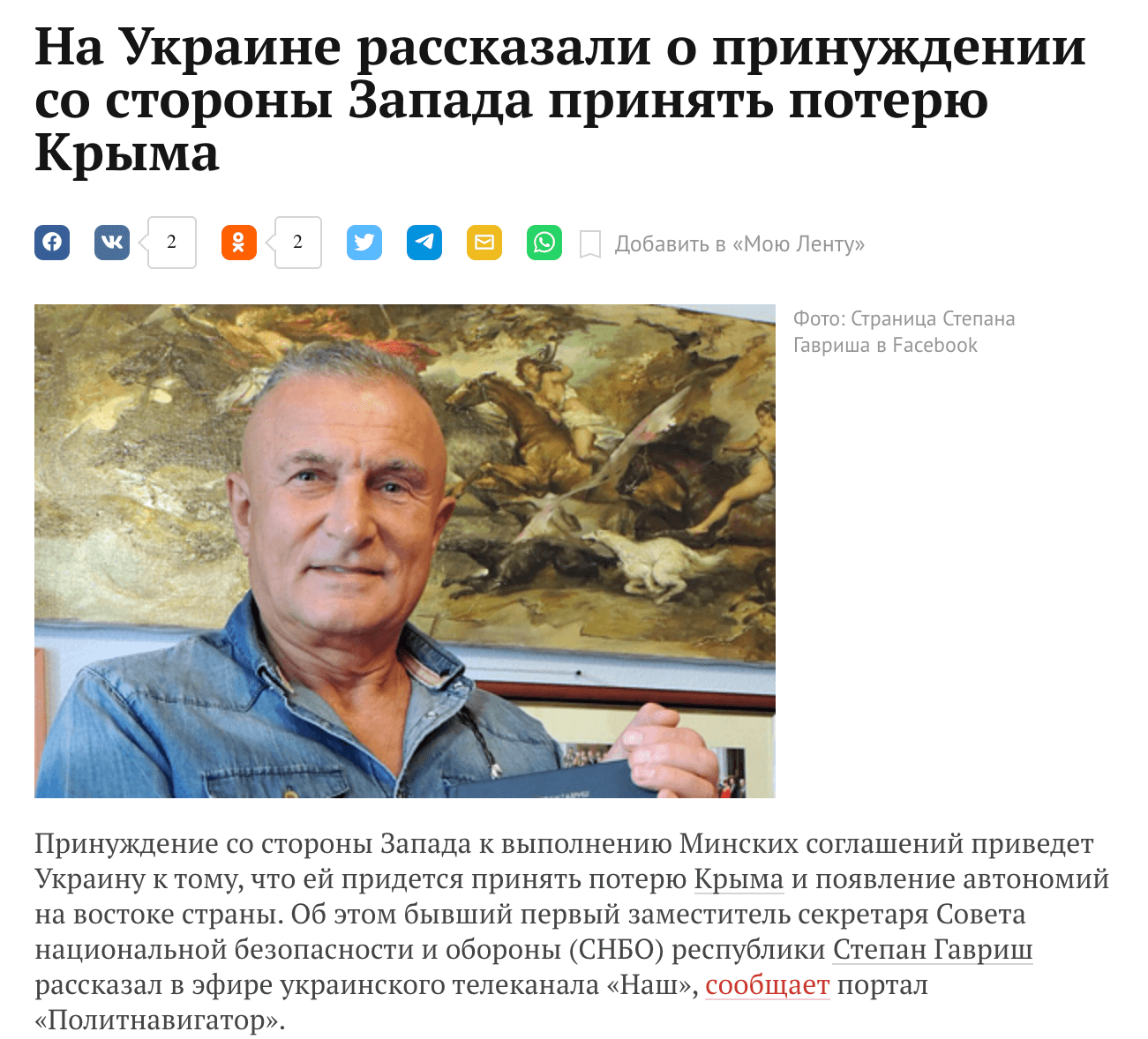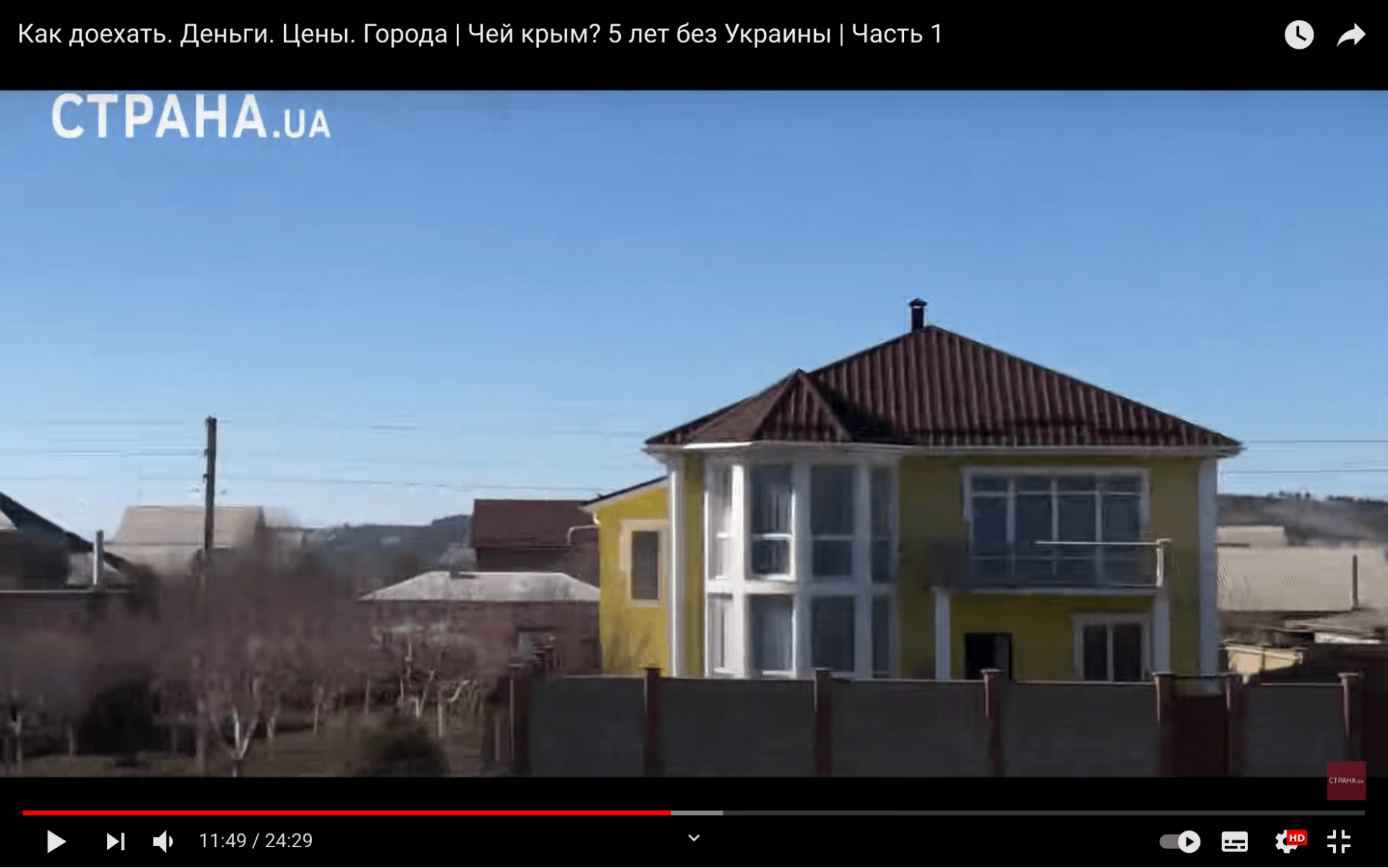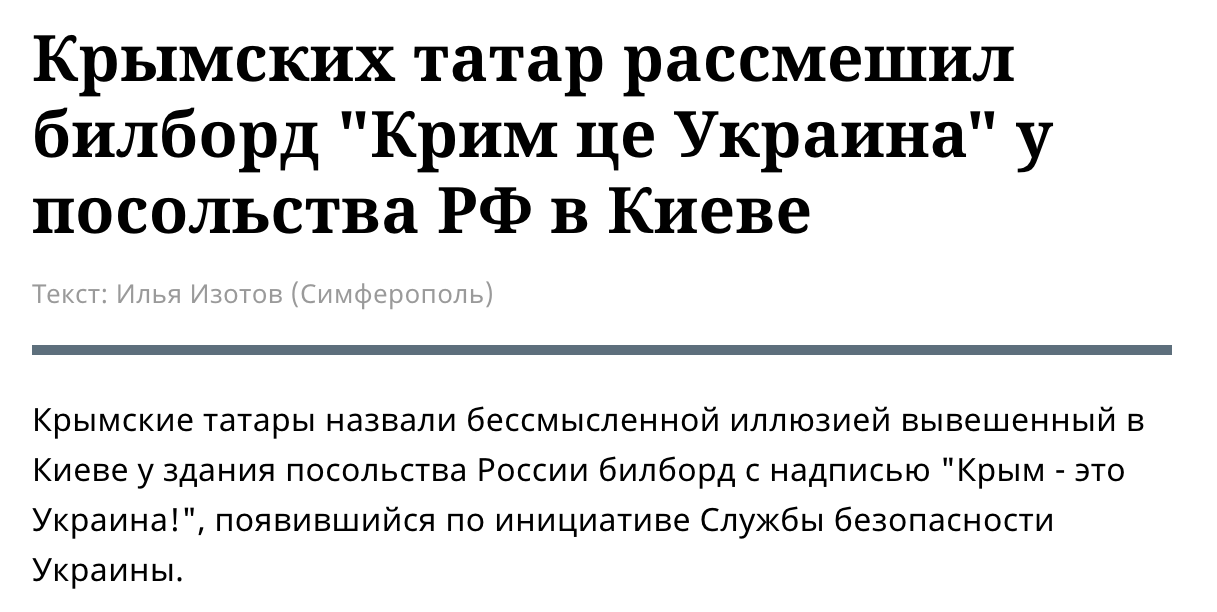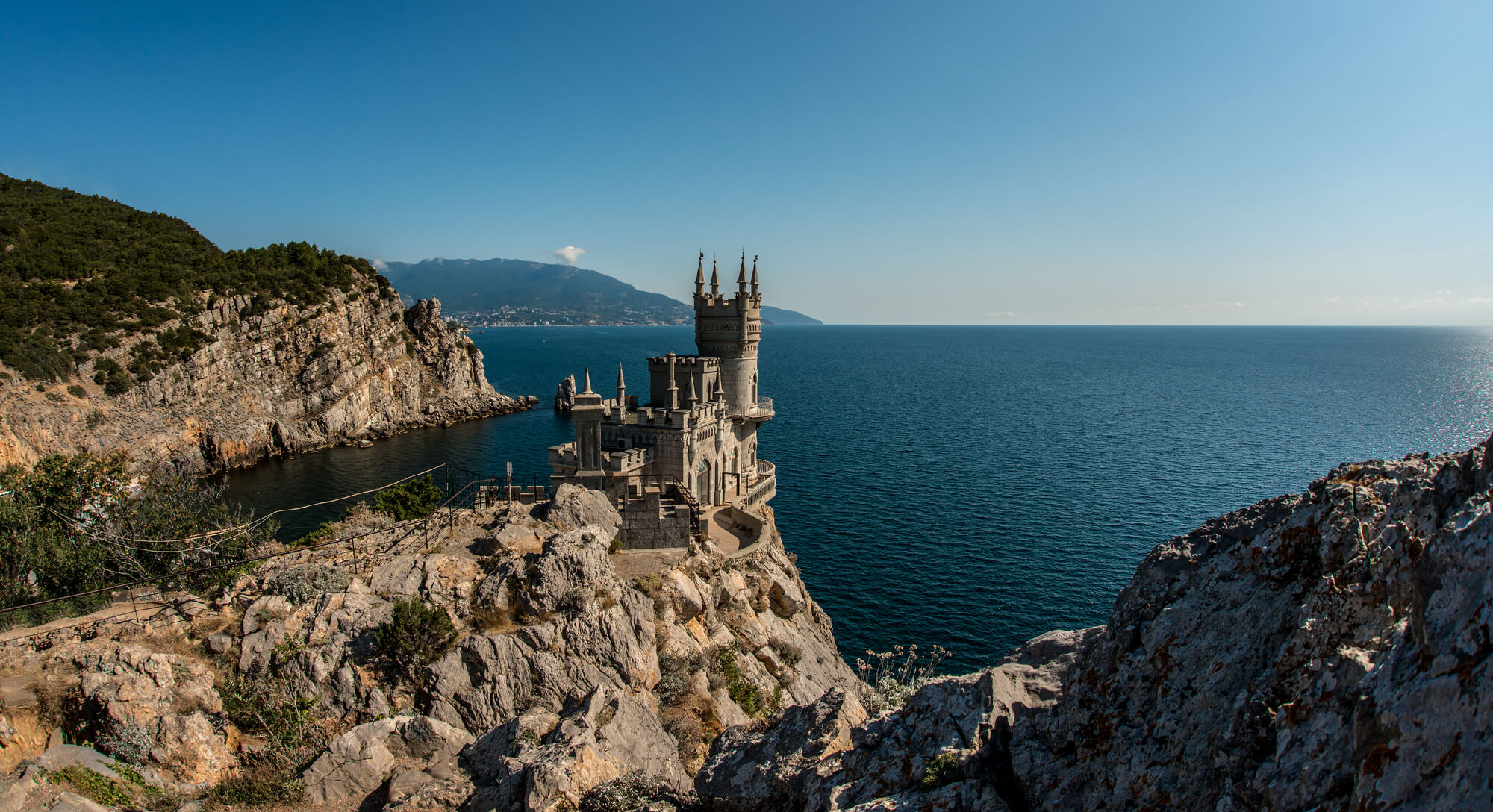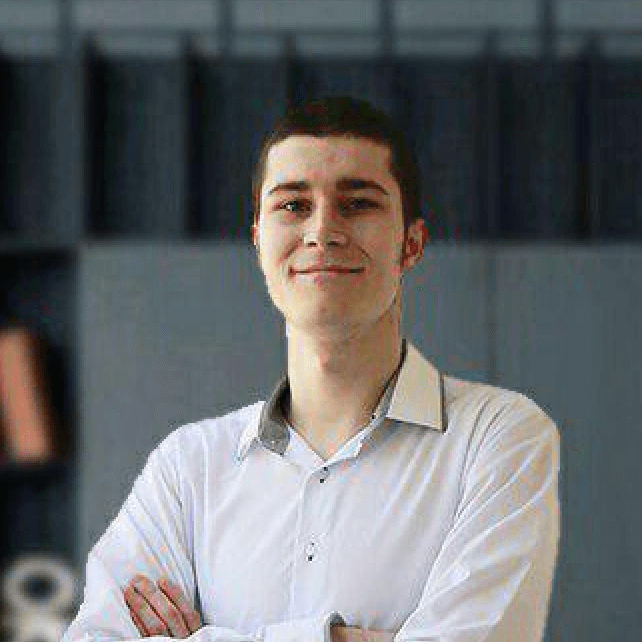The Crimean Platform Summit as the first international format for de-occupation of Crimea kicked off on August 23 in Kyiv. At the summit, Ukrainian authorities are discussing ways of returning the peninsula, currently under the occupation of Russia. Dozens of foreign delegations agreed to take part in the conference. Representatives of all EU and NATO countries arrived at the summit, while Russia refused to participate.
No wonder that Moscow waged an information campaign against the Crimean Platform, calling it “a neo-Nazi sabbat” and an encroachment on Russia’s “territorial integrity”. They spread fake news and manipulation regarding the summit. For instance, they tried to convince others that Kyiv had no money for it. But attempts to undermine statements or initiatives concerning de-occupation of Crimea have continued much longer. At least for seven years since the annexation. Russia has been trying to convince the world that Crimea joined Russia voluntarily and will remain part of it forever.
VoxUkraine together with Regional Center for Human Rights debunks the main narratives of Russia’s occupation of Crimea.
Fake news: The Crimeans made their choice
Since the first years of annexation, Putin has insisted that the future of the occupied Crimea was determined by people in Crimea. “They made their choice” is the cliché of Russian propagandists. To have something to “justify” the occupation of the Ukrainian peninsula in the eighth year, they had to hold a pseudo-referendum “On the status of Crimea” in 2014.
Propagandists even managed to drag the “Crimean choice” into the Tokyo Olympic Games. When the IOC approved a new Olympic motto (“Faster, Higher, Stronger – Together”) that previously did not include the word “together”, Russia suspected it had to do with tolerance for those of other sexual orientation. “If one respects the decisions of people prone to same-sex partnerships, then why not accept the decision by people of Crimea to become part of Russia?” a Russia Today journalist wrote. In this way, the propagandists suggest that the decision to join Russia was a “free choice” of the residents of Crimea. Just like in today’s world where people are free to choose their sexual partners.
Pridybailo: the IOC supports same-sex marriages but doesn’t recognize Crimea to be part of Russia
Source: Russian Federal News Agency. It is associated with the Olgino Troll Factory disseminating disinformation, including about Ukraine.
The so-called “referendum” had nothing to do with “free choice”
The decision to hold the so-called “referendum” was made at a session of the Verkhovna Rada of Crimea on February 27, 2014. The parliament building was seized by unidentified military forces. Krym.Realii writes that journalists were not allowed into the session hall, so it is not known whether there was a quorum for such a decision and how MPs voted under the muzzles of Tommy guns. In 2015, one of the leaders of the operation to take over Crimea, Igor Strelkov (Girkin), admitted that the deputies had to be “herded” into the Parliament to vote on February 27.
Two questions were put to the “referendum”: “Do you support the reunification of Crimea with Russia as a subject of the Russian Federation?” and “Do you support the restoration of the Constitution of the Republic of Crimea as of 1992 and the status of Crimea as a part of Ukraine?”. None of them provided for the possibility of maintaining the status quo.
Crimea’s Constitution as of 1992 provided broad autonomy rights for the peninsula. As if it were a separate state with its own government bodies “exercising on its territory all of the powers except those voluntarily delegated to Ukraine”.
The “referendum” is also illegal from the point of view of Ukrainian laws, Mykola Kikkas, an expert at the Regional Center for Human Rights explains. According to Article 73 of the Constitution of Ukraine, the issue of changing the territory is decided only by an all-Ukrainian referendum. Whether Crimea should be part of Ukraine had to be decided by all the regions, and the voting of people in Crimea alone was not enough for such a decision.
Besides, the Crimean “referendum” took place without international observers who could record violations. At the same time, Crimean journalists and voters repeatedly stated that ballots were handed out in a massive way to the same people. They were also handed out to people with Russian passports.
Neither Ukraine nor the European Union or the United States recognized the results of Crimea’s “referendum”. On March 27, 2021, the UN Security Council issued a resolution in support of Ukraine’s territorial integrity. The European Union adheres to a strict policy of not recognizing the results of the illegal “referendum”. Economic sanctions imposed on Russia by the EU after the annexation of Crimea and the war in Donbas have not been lifted since 2014.
Fake news: Ukraine organized the “water blockade” of Crimea
For the eighth consecutive year, pro-Kremlin media claim that Ukraine is to blame for Crimea’s water supply problems. It is alleged that Kyiv staged the “water blockade” by closing the North Crimean Canal in 2014. False rumors are spreading that this is how Ukraine “punishes” Crimeans that “made the choice” to be part of Russia. They also talk about a “humanitarian catastrophe“ on the peninsula, which ostensibly makes Russia “entitled” to send in troops.
Russia’s foreign ministry says Kyiv’s attempts to punish Crimeans lead to heightened tensions
Deputy director of the department of information and press of the MFA Ilya Timokhov says the water blockade of the peninsula can lead to another humanitarian catastrophe, with unpredictable consequences.
Source: TASS
In reality, there is no threat of a humanitarian catastrophe in Crimea, Regional Center for Human Rights (RCHR) explains. Huge amounts of Crimea’s water resources go to large enterprises and the constantly increasing military contingent of the Russian Federation. And even so, the local population is not completely without water. Therefore, if available water resources are given to people, the issue of lack of water for household use will be resolved. Besides, Ukrainian officials have repeatedly stated that Ukraine will supply water to Crimea in the event of a real threat of humanitarian catastrophe.
According to RCHR expert Mykola Kikkas, international law does not contain any provisions that would allow Russia to use force because of closing the North Crimean Canal. The use of force is only possible in a situation of a state’s self-defense if an armed attack occurs against it waged by another state (Article 51 of the UN Charter).
While Crimea is occupied, Russia is obligated to provide the population with water
The fact that Ukraine refuses to supply water to Crimea is not “genocide,” as the RF claims. Crimea is under occupation, and international humanitarian law applies to its territory. Article 55 of the Fourth Geneva Convention on the Protection of Civilian Persons in Time of War stipulates that the Occupying Power is placed under an obligation to ensure, to the fullest extent of the means available to it, the food and medical supplies of the population, including any other necessities like drinking water and water for household use.
Propaganda manipulates the word “genocide” to achieve a psychological effect. However, under the UN Convention on the Prevention and Punishment of the Crime of Genocide, genocide is an act committed with intent to destroy, in whole or in part, a national, ethnic, racial or religious group.
Closing the North Crimean Canal has no such consequences, Mykola Kikkas explains. Of course, it can cause inconvenience and even material damage to people and businesses in Crimea. However, there is a huge difference between damage and genocide.
Fake news: Ukraine is ready to accept the annexation
Pro-Kremlin media claim that Ukraine has already “come to terms with the fact that Crimea belongs to Russia”. Like enough time has passed for Kyiv to realize that the issue of Crimea will be closed once and for all.
As proof, the propagandists cite interviews with pro-Russian “experts” in the Ukrainian media backing up the position on Crimea favorable for the Kremlin. The maps of Russia including the peninsula published by a Ukrainian state channel are also attached.
President of Ukraine Vladimir Zelensky stated that Crimea will never be Russian territory and its return is a matter of time. He said that in an interview for the Ukrainian state channel Dom – a TV channel that showed on air a map with Russian Crimea.
The source: CKKh Telegram channel
Ukraine will never recognize the annexation of Crimea
There are no official statements from Ukrainian authorities about their readiness to recognize the Crimean peninsula as part of the Russian Federation. Ukrainian politicians have repeatedly emphasized that Crimea belongs to Ukraine, including president Volodymyr Zelenskyi.
Section X of the Constitution defines the Autonomous Republic of Crimea as an integral part of Ukraine. The peninsula is officially recognized as a territory temporarily occupied by Russia. No document has been approved by the Verkhovna Rada that would recognize Crimea or a part of it as the territory of the Russian Federation.
The Russian information and analytical portal Alternativa refers to the interview with a former Soviet KGB lieutenant colonel, Volodymyr Popov, for the Ukrainian news site Obozrevatel (known to regularly disseminate Russian narratives). The ex-official said that Ukraine should not expect Crimea to come back and had better focus on other issues. Russian propagandists picked up this interview as “proof” of Ukraine’s putting up with “Russian Crimea”. That is manipulation. Volodymyr Popov is not a representative of Ukrainian authorities, and this statement is his personal opinion, not the position of official Kyiv.
The Ukrainian state TV channel Dom did publish a map of the Russian Federation that included Crimea on the screensaver of the Russian Diary program. According to the channel, that screensaver differed from the standard one they usually use for the program. The standard screensaver shows Russia without Crimea. They referred to this case as a provocation, saying that the appearance of such a map is being investigated by the internal security service. In the message, the channel’s representatives noted that they support the territorial integrity of Ukraine and consider Crimea its integral part.
Fake news: The world recognizes Crimea as Russian territory
One of Russia’s widespread fake statements is the assertion that the world community recognizes the peninsula as part of the Russian Federation. According to the Russian Internet channel Lenta.ru, Western countries are forcing Ukraine to recognize the loss of Crimea. Representatives of the “Republic of Crimea” (the official Russian name for the peninsula after the annexation) were able to get into an OSCE conference, and the peninsula was allegedly repeatedly visited by “foreign delegations”. All of this is presented by Kremlin propagandists as proof that international organizations and governments of foreign states recognize Russian Crimea.
They say in Ukraine that the West is forcing Ukraine to accept the loss of Crimea.
The West’s compelling Ukraine to implement the Minsk agreements will eventually have Ukraine accept the loss of Crimea and establish autonomies in the east of the country. Stepan Havrysh, former first deputy of the National Security and Defense Council of the republic said so on air of the Ukrainian TV Channel Nash, the portal Politnavigator reports.
Source: Lenta.ru
The world community has not recognized Crimea as Russian territory
According to Kateryna Rashevska, a lawyer at Regional Center for Human Rights, Russian attempts to include representatives of the so-called “Republic of Crimea” in the list of official delegations are usually unsuccessful. However, sometimes the Russian Federation deliberately conceals information about the delegates’ origin by issuing foreign passports for them outside Crimea (e.g. in Moscow or Krasnodar Krai) or deliberately “erroneously” spelling the names of Crimean “diplomats”. In this way, using deception, the Crimean “representatives” not previously included in the official lists take part in international events.
According to international law, states and international organizations are obligated not to recognize the consequences of an internationally illegal act, which is the occupation and inclusion of Crimea in the Russian Federation. The “Republic of Crimea” represented by the Crimean “delegates” is therefore non-existent in terms of international law, hence plainly illegitimate.
Crimea is not recognized as Russian territory by any of the international organizations, except those created by the RF. The OSCE and the UN are parties to a number of international agreements, under which the Crimean peninsula is recognized as part of Ukraine’s sovereign territory.
Russia also disseminates information about the visits of “representatives of foreign delegations” to Crimea. Such statements are often taken out of context or downright fake. For instance, in March 2018, the Russian Federal News Agency reported a visit by a Norwegian delegation to Crimea. The publication claims that such visits bring closer international recognition of “Russian Crimea”. However, it turned out that in reality, the “official delegation from Norway” was a group of Norwegians who went on a private trip to the peninsula contrary to the advice of their government. Similar stories were told about “delegations” from Turkey, Finland, and the USA.
Russian media sometimes claim that Crimea is visited by European politicians, including members of the European Parliament. However, such visits are made by representatives of pro-Russian parties. Such as the infamous representatives of pro-Russian Alternative for Germany who indeed visited the occupied Crimea.
This cannot, however, serve as proof that the EU recognizes Crimea as Russian territory. The European Union has not officially recognized the annexation of the peninsula by Russia.
Fake news: Russia does not persecute Crimean Tatars
Mass arrests and house searches of activists in the occupied Crimea are either silenced by local and Russian media or presented as “the fight against terrorism”. Instead, Ukrainian authorities’ statements about persecution in Crimea are rejected.
Russian narratives are clearly seen in the rhetoric of Ukrainian pro-Russian media. For instance, during her travels across Crimea, Strana’s journalist Lesya Medvedeva told in her 2019 video blog about how Crimean Tatars “actually” live.
“Ukrainian authorities very often say that Crimean Tatars are very much oppressed in today’s Crimea. Here, we’re passing by Crimean Tatar villages. I’ll now show you how they’re oppressed… they’re oppressed on two floors. On two, three, four…” comments Medvedeva about private houses in one of the districts.
Footage from a Strana’s video blog about Crimea after the occupation. The screenshots allegedly show the homes of Crimean Tatars, although Medvedeva does not mention what kind of locality this is and why she is sure that the houses belong to Tatars.
After Russia’s occupation of Crimea, Russian security forces began mass arresting activists of the Crimean Tatar national movement, civic activists, independent journalists, and Crimean Muslims on the peninsula. The main article applied to political prisoners is participation in a terrorist organization.
Hizb ut-Tahrir is considered to be such an organization in Russia. Its members say its mission is to unite all Muslim countries in an Islamic caliphate, but they reject terrorist methods. Hizb ut-Tahrir has been banned in Russia since 2003, but it operates without restriction inside Ukraine and in most parts of the world.
79 Crimean Tatars were imprisoned based on allegations of involvement with Hizb ut-Tahrir. Some of them got 19 years in prison. And the defendants in the second Bakhchisaray “case” were sentenced to 110 years in prison for seven (over the years, arrests took place in several stages, hence several groups named after the cities where the arrests took place). The list of “cases” and sentences is kept by Crimean Solidarity.
Parliament Commissioner for Human Rights Liudmila Denysova said in early 2021 that a total of 109 political prisoners were held in prisons in Russia and Crimea, among them 75 Crimean Tatars. Crimean lawyer and human rights activist Lilya Gemedzhi talked about 115 political prisoners. 15 of them are the elderly and people with disabilities.
Manipulation: Crimean Tatars support Russia
The Russian media is trying to create a reality in which Crimean Tatars support Russia. To this end, the media periodically cite “leaders” of the so-called “national and cultural autonomy of the Crimean Tatars”. In reality, these are Russian-controlled public organizations created as an alternative to the Mejlis.
The billboard “Crimea is Ukraine” near the Russian Embassy in Kyiv got Crimean Tatars laughing
Crimean Tatars called the billboard near the building of the Embassy of Russia saying “Crimea is Ukraine” a nonsensical illusion set up at the initiative of the Security Service of Ukraine.
Screenshot of Rossiyskaya gazeta, a Russian government media
The Mejlis of the Crimean Tatar People resisting the Russian occupation was banned in 2016. It was called “extremist”, and ever since then, this representative body of the indigenous people cannot work in their homeland.
“Chief of the Mejlis extremists, Refat Chubarov, was sentenced to 6 years in absentia as well as a fine of RUB 200,000 and 200 hours of community service.
Since 2014, Chubarov has been living in Ukraine, from where he has been leading consistent, anti-Russian activities supporting various provocative actions of Ukrainian authorities against Crimea”.
Post in a Crimean telegram channel
The Crimean Tatars did not have much historical reason to rejoice at yet another Russian occupation. Russia and the Soviet Union destroyed the Crimean Tatars for centuries, beginning with the elimination of their state during the first annexation of Crimea in 1783. In 1944, about 200 thousand indigenous people were deported from the peninsula, being accused of “collaborationism”. According to various official estimates, 20-25% of all Crimean Tatars died in special settlements (46% according to an unofficial, self-conducted census of the National Movement of Crimean Tatars). Others died from inhumane conditions in the trains during the deportation. Statements by some Crimean Tatars in support of the occupation are their personal position.
Undermining the Crimean Platform
In early August, Russian state media outlets spread the news that Ukraine “had no money for Crimea“ and that “funds were scarce for the Crimean Platform”.
No money for Crimea. Kyiv admits its helplessness
Source: RIA Novosti
It is a manipulation of the quote of Emine Dzhaparova, First Deputy Minister for Foreign Affairs of Ukraine. In a comment to the Ukrainian news agency UNN, she said: “Ukraine cannot hold annual events of such magnitude as this year’s summit, the Crimean Platform”. But the plan is to have an annual summit, so the authorities will seek a solution. Of course, Russian media made it look like there was no money to even hold the summit this year.
Another way of undermining the Crimean Platform is through homophobia. Lenta.ru came up with the news that US Secretary of Transportation Pete Buttigieg representing the United States at the Crimean platform is gay.
Crimea and homophobia in the Russian media have been going side by side for over a year now. In 2019, Life even wrote that “Europeans are seeking refuge in Russia and specifically in Crimea from aggressive sex education, gay dictatorship and juvenile justice in Europe”. These “Europeans” were tagged “moral migrants”. RIA Novosti wrote about Russian Germans who fled to Crimea “because of the unwillingness to put up with the destruction of the family and Christian values in the West”. Moralizing as an element of propaganda is thus not exactly a new trick for the Kremlin.
Conclusion
Reporting on the subject of Crimea, the Russian media, therefore, use the same narratives as for Ukraine in general, i.e. the “will of the people” allegedly wanting to be in Russia, Ukraine as a failed state and a lack of international support. Of course, that is not the case. Crimea was seized by the Russian army and the people had to express “their will” already under the barrels of Tommy guns, contrary to Ukrainian and international law. Ukraine has established itself as a state and has international support, including for its territorial integrity. Dozens of delegations headed by presidents, heads of governments and parliaments, ministers and heads of international structures arrived at the summit dedicated to de-occupation of Crimea. It is proof that despite considerable efforts, Russia has failed to justify the annexation. And unlike Ukraine, it has not received support from the international community.
We thank Regional Center for Human Rights for their collaboration, and particularly communications manager Iryna Usmanova. We thank lawyers Kateryna Rashevska and Mykola Kikkas for promptly providing comments for this article.
Attention
The authors do not work for, consult to, own shares in or receive funding from any company or organization that would benefit from this article, and have no relevant affiliations
